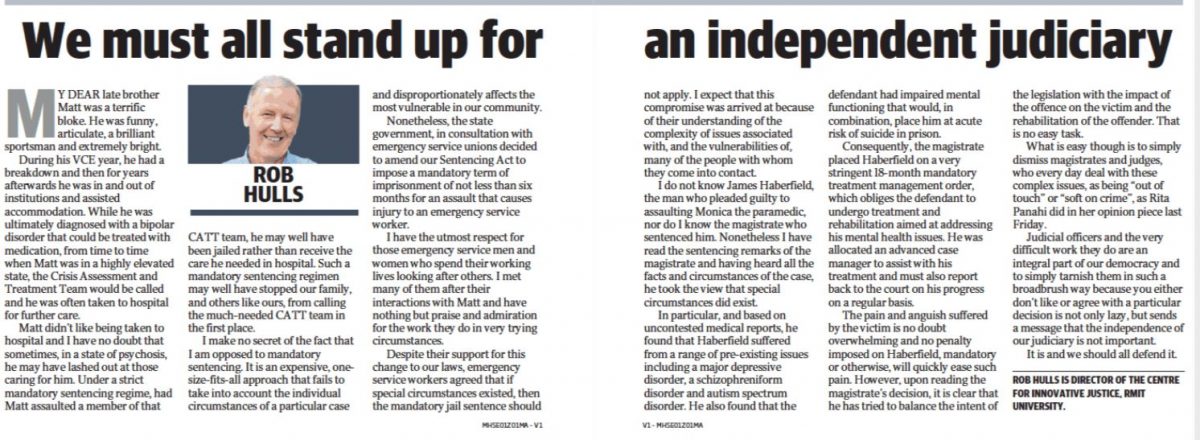“We must all stand up for an independent judiciary”
Opinion piece by Rob Hulls published in the Herald Sun, 2 September 2019
My dear late brother Matt was a terrific bloke. He was funny, articulate, a brilliant sportsman and extremely bright.
During his VCE year, he had a breakdown and then for years afterwards he was in and out of institutions and assisted accommodation. Whilst he was ultimately diagnosed with a bi-polar disorder that could be treated with medication, from time to time when Matt was in a highly elevated state, the Crisis Assessment and Treatment Team (CATT) would be called and he was often taken to hospital for further care. Matt didn’t like being taken to hospital, and I have no doubt that sometimes, in a state of psychosis, he may have lashed out at those caring for him.
Under a strict mandatory sentencing regime, had Matt assaulted a member of that CATT team, he may well have been locked up in jail rather than receive the care he needed in hospital. Such a mandatory sentencing regime may well have stopped our family, and others like ours, from calling the much needed CATT team in the first place.
I make no secret of the fact that I am opposed to mandatory sentencing. It is an expensive, one size fits all approach that fails to take into account the individual circumstances of a particular case and disproportionately affects the most vulnerable in our community.
Nonetheless, the State Government, in consultation with Emergency Service Unions decided to amend our Sentencing Act to impose a mandatory term of imprisonment of not less than 6 months for an assault that causes injury to an emergency service worker.
I have the utmost respect for those emergency service men and women who spend their entire working lives looking after others. I met many of them after their interactions with Matt, and have nothing but praise and admiration for the work they do in very trying circumstances.
Despite their support for this change to our laws, emergency service workers agreed that if special circumstances existed, then the mandatory jail sentence should not apply. I expect that this compromise was arrived at because of their understanding of the complexity of issues associated with, and the vulnerabilities of, many of the people with whom they come into contact.
I do not know James Haberfield, the man who pleaded guilty to assaulting Monica the paramedic, nor do I know the Magistrate who sentenced him. Nonetheless I have read the sentencing remarks of the Magistrate, and having heard all the facts and circumstances of the case, he took the view that special circumstances did exist in this case. In particular, and based on uncontested medical reports, he found that Mr Haberfield suffered from a range of pre-existing issues including a Major Depressive Disorder, a Schizophreniform Disorder and Autism Spectrum Disorder. He also found that the defendant had impaired mental functioning that would, in combination, place him at acute risk of suicide in prison. Consequently, the Magistrate placed Mr Haberfield on a very stringent 18 month Mandatory Treatment Management Order, which obliges the defendant to undergo treatment and rehabilitation aimed at addressing his mental health issues. He was allocated an Advanced Case Manager to assist with his treatment and must also report back to the Court on his progress on a regular basis.
The pain and anguish suffered by the victim is no doubt overwhelming and no penalty imposed on Mr Haberfield, mandatory or otherwise, will quickly ease such pain. However, upon reading the Magistrates decision, it is clear that he has tried to balance the intent of the legislation with the impact of the offence on the victim and the rehabilitation of the offender. This is no easy task.
What is easy though is to simply dismiss Magistrates and Judges, who every day deal with these complex issues, as being “out of touch” or “soft-on-crime”, as Rita Panahi did in her opinion piece last Friday.
Judicial Officers and the very difficult work they do are an integral part of our democracy and to simply tarnish them in such a broad-brush way because you either don’t like or agree with a particular decision is not only lazy, but sends a message that the independence of our judiciary is not important. It is, and we should all defend it.
Rob Hulls
Director, Centre for Innovative Justice
RMIT University
*This opinion piece was published in the Herald Sun newspaper on Monday 2 September 2019

